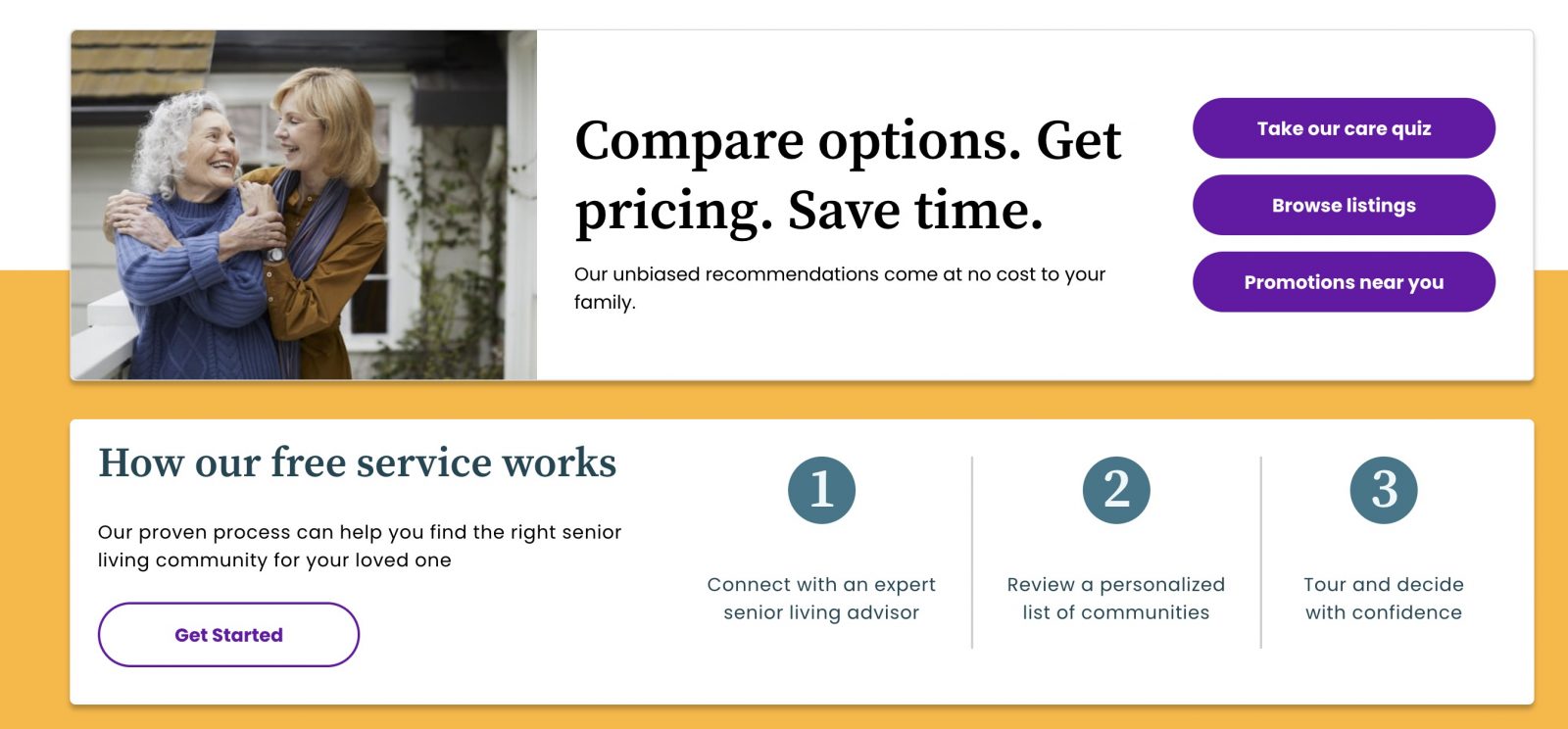A Place for Mom has emerged as a helpful resource for families navigating the often-complex journey of finding senior living options for their loved ones. As a free service, it provides guidance by comparing different communities, offering personalized recommendations, and tailoring search results to each family’s unique needs. Whether the need is for assisted living, memory care, or nursing home care, A Place for Mom strives to simplify the decision-making process by collating data and providing assessments tailored to each senior’s situation.
Understanding what each type of senior care entails, the amenities offered, and the associated costs is crucial. The information provided by A Place for Mom includes insights into the services available in-home or within a community setting, the benefits of each type of care, and a clear breakdown of potential expenses. They aim to reduce the stress on families by presenting a clear picture of the options and equipping them with the knowledge to make informed decisions about their loved one’s care and well-being.
In finding the right fit, it’s not just about the practical details but also the emotional support and understanding the challenges caregivers face. A Place for Mom acknowledges this by providing a platform for families to view reviews and ratings, offering them a sense of connection and reassurance from those who have been in similar situations. They provide not only a list of services but also a compassionate approach to help those caring for seniors feel less alone in the process.
Reader's Roadmap
Key Takeaways
- A Place for Mom is a tool for families to find senior living options, personalized to their needs.
- It offers detailed insights into types of senior care and the financial implications of each.
- The service provides emotional support and community connection for caregivers.
Understanding Senior Living Options
When deciding on senior living, it’s important to consider the various options available to meet the changing needs of older adults. Each type of community caters to different levels of care and lifestyle preferences, ensuring that there is a suitable place for every senior.
Assisted Living
Assisted Living communities are designed for seniors who require assistance with daily activities like bathing, dressing, and medication management. These communities typically offer:
- Personalized Care Plans: Tailored to each resident’s needs.
- Social Activities: To promote community living and engagement.
- Dining Services: Meals provided to ensure proper nutrition.
Memory Care Communities
Memory Care communities specialize in caring for individuals with memory impairments, such as Alzheimer’s disease and other forms of dementia. They feature:
- Secure Environments: To prevent wandering and ensure safety.
- Structured Programs: Aimed at preserving cognitive functions.
Independent Living
Independent Living options are for seniors who can live alone but want the convenience of community living. Typical features include:
- Senior Apartments: Offering a maintenance-free lifestyle.
- Retirement Community: With amenities like fitness centers and social events.
Home Care Services
Home Care Services provide support to seniors who prefer to stay in their own home. Caregivers can assist with:
- Daily Tasks: Such as meal preparation and light housekeeping.
- Health Care Needs: Including medication reminders and health monitoring.
Financial Considerations
When considering A Place for Mom, it’s important to understand the financial commitment involved. From the costs associated with senior care to the potential benefits available to veterans, being informed on the financial aspects can make a major difference for families.
Assessing Costs
The cost of senior care services varies widely depending on care type, location, and individual needs. Families need to evaluate their budgets closely and compare care options. A Place for Mom provides tools and resources that can help one get a clear view of the expected expenses. Rates fluctuate, so it’s crucial to get current cost estimates.
- In-home care: May involve hourly rates or flat fees.
- Assisted living facilities: Often operate on monthly rates.
- Nursing homes: Typically, these come with higher costs due to increased care levels.
Exploring Veterans Benefits
Veterans or their surviving spouses may be eligible for benefits that can significantly offset the cost of senior care. The Aid and Attendance benefit, for example, is a monthly payment added to the amount of a monthly VA pension. Here are some specifics:
- Eligibility: Must meet certain service and financial requirements.
- Benefit Usage: Can be applied to in-home care, assisted living, and more.
- Application Process: Can be complex and may require assistance.
Understanding Fee Structures
A Place for Mom operates with a unique business model where the service is typically free for families, with fees earned through referrals to partner communities and providers.
- No direct cost to families: Ensures accessibility to their services.
- Payment from partners: Generates the revenue for A Place for Mom.
- Transparent structures: Important for trust-building with clients.
Health and Wellness
When it comes to the health and wellness of our loved ones, especially as they age, ensuring their safety and providing adequate health care resources are paramount. A Place for Mom emphasizes the importance of both, along with the benefits of in-home health care services.
Prioritizing Safety and Well-Being
The well-being of seniors is deeply intertwined with their safety. Fall prevention is critical, as falls are a common cause of injuries and can lead to complications like a stroke. Safety measures might include making home modifications or providing mobility aids to reduce the risk of accidents.
Health Care Resources
Access to health care resources is a significant aspect of senior wellness. This includes routine visits to the doctor and efficient management of medications. Ensuring seniors have the information and support they need can greatly impact their overall health and quality of life.
In-Home Health Care
In-home health care offers personalized support while promoting independence in familiar surroundings. Services range from assistance with daily activities to medical interventions. It’s tailored care that keeps health care professionals in the loop, ensuring one’s well-being is always the top priority.
Choosing the Right Community
When families and seniors consider a transition to a senior living community, it’s crucial they focus on finding a place that feels like home and suits their needs. It involves examining real-life experiences and accessible data on locations, ensuring a well-informed decision.
Senior Living Reviews
Reviews provide invaluable insights into the day-to-day experiences of residents within senior living communities. They give voice to personal stories, capture the essence of the community culture, and highlight the staff-to-resident interactions. For example, one might find reviews that commend a community in Seattle, WA, for its outstanding activities program or a helpful account of the accommodating staff in a facility in Chicago, IL. Gathering multiple perspectives can give a clearer picture, so it’s wise to read a range of reviews.
Location Specific Information
Location is a determining factor when choosing the right senior living community. Factors such as proximity to family, medical facilities, and social amenities play a significant role. Here’s a glance at three major cities:
- New York, NY: Known for its vibrant lifestyle and extensive services. Senior communities here offer a multitude of social opportunities that cater to the diverse needs of their residents.
Community Attributes Benefits for Residents Access to cultural events Enriched social life Proximity to renowned hospitals Peace of mind in healthcare - Chicago, IL: Features communities that provide comfort with a Midwestern charm. For residents who appreciate architecture and seasons that change, Chicago’s communities offer both beauty and variety.
Community Attributes Benefits for Residents Architectural beauty and parks Inspiring living environment Seasonal activities Engaging and dynamic lifestyle - Seattle, WA: Boasts stunning natural beauty and a relaxed pace of life. Senior living communities here often offer panoramic views and nature-infused settings that appeal to those who love the outdoors.
Community Attributes Benefits for Residents Scenic views Restorative and calm ambience Proximity to nature Outdoor engagement and activity
Each location has its unique offerings, and it’s beneficial for families to seek out tailored advice to find the perfect match.
Support for Caregivers
Caring for a loved one can be both rewarding and challenging. Support systems are essential to help caregivers navigate the complexities of senior care, whether it’s finding temporary relief through respite care or accessing valuable caregiving tips and resources.
Finding Respite Care
Respite care is a service that offers temporary relief to primary caregivers, allowing them a well-deserved break while ensuring their loved ones continue to receive professional care. Here’s how one might find respite care:
- Research: Look for trusted organizations that provide respite care.
- Evaluate: Assess the kind of respite care needed—whether in-home or at a residential care home.
- Coordinate: Work on scheduling and payment details, ensuring it fits the family’s needs.
It’s important to remember that respite care should be a positive experience for both the caregiver and their loved one, allowing for recharging and maintaining balance.
Caregiving Tips and Resources
Caregivers often require guidance and support. Below are some ways they can access valuable information:
- Online Support Groups: Safe spaces online where caregivers can share experiences and advice.
- Educational Articles: Written materials that provide tips and tricks for effective caregiving.
- Caregiver Training: Some organizations offer courses to help caregivers cope with the emotional and physical demands of caregiving.
Whether they’re assisting with daily living activities at home or managing care in a residential setting, caregivers can benefit immensely from leveraging these resources.







Leave a Reply
View Comments